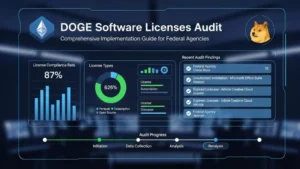Introduction to Doge Software Licenses Audit HUD
The Doge Software Licenses Audit HUD is a vital tool designed to facilitate the management and compliance of software licenses. As software development continues to evolve, organizations face significant challenges in tracking, maintaining, and optimizing their software licenses. The complexities arise from a multitude of factors such as diverse licensing models, frequent software updates, and a growing portfolio of applications. Each element adds layers of difficulty, making it imperative for developers and organizations to implement effective systems to ensure compliance. The Audit HUD addresses these challenges by providing an organized approach to monitor software licenses efficiently.
Software compliance is essential for organizations to mitigate risks associated with license violations, which can result in financial penalties and legal ramifications. The Doge Software Licenses Audit HUD helps organizations navigate this landscape by providing a unified dashboard that consolidates information regarding software licenses and their usage. By centralizing the data, it allows businesses to gain better visibility into their software assets and understand their obligations under various licensing agreements. This ensures that organizations can deploy software responsibly while avoiding potential pitfalls.
Moreover, the integration of the Audit HUD offers a proactive method for compliance. Organizations can conduct regular audits, identify potential discrepancies, and promptly address issues before they escalate into serious violations. This proactive approach not only streamlines compliance processes but also fosters a culture of accountability among software users within the organization. In essence, the Doge Software Licenses Audit HUD emerges as an indispensable resource for any software-dependent business, offering clarity and control in the complex world of software licensing. As organizations continue to invest in digital transformation, embracing such tools will be crucial for sustaining operational integrity and minimizing legal risks.
Key Features of Doge Software Licenses Audit HUD
The Doge Software Licenses Audit HUD stands out due to its essential features that facilitate efficient software license management for organizations. One of the most significant functionalities is automated license tracking. This feature enables organizations to monitor their software licenses in real-time, ensuring that they remain compliant with licensing agreements. By constantly updating license usage data, organizations can identify underutilized or overused licenses, minimizing the risk of non-compliance and associated penalties.
Another critical attribute is its comprehensive reporting capabilities. The Doge Software Licenses Audit HUD offers various reporting tools that allow organizations to generate detailed reports on software usage and compliance status. This functionality is vital for conducting internal audits and preparing for external audits by providing relevant data in an organized manner. Organizations can leverage these reports to make informed decisions about software procurement and management, optimizing their software portfolio while staying compliant with licensing laws.
The user-friendly dashboards featured in the Doge Software Licenses Audit HUD further enhance the experience for administrators and users alike. These dashboards present data visually, allowing for easy interpretation of licensing information. A streamlined interface reduces the learning curve, enabling users to navigate and utilize the tool’s functionalities effectively. This characteristic is particularly beneficial for organizations with limited IT resources, as it minimizes the need for extensive training.
Lastly, integration with existing software management systems is a significant advantage of the Doge Software Licenses Audit HUD. The ability to seamlessly connect with various platforms ensures that organizations can maintain a cohesive management system without disrupting existing workflows. This interoperability aids in centralizing data and streamlining operations, making it simpler to manage software across multiple departments. Collectively, these key features empower organizations to uphold software license compliance and manage their IT resources effectively.

Benefits of Implementing Doge Software Licenses Audit HUD
Implementing the Doge Software Licenses Audit HUD offers a multitude of advantages for organizations looking to optimize their software asset management. One of the primary benefits is the potential for significant cost savings through the reduction of software license fines. By ensuring compliance with software licensing agreements, businesses can mitigate the risk of incurring penalties that often arise from unauthorized use or mismanagement of software licenses. The Audit HUD provides tools that help organizations track their license usage accurately, which is essential for maintaining compliance and avoiding financial repercussions.
In addition to cost savings, organizations can greatly enhance their risk management strategies by utilizing the Doge Software Licenses Audit HUD. Accurate tracking and reporting on software usage allow businesses to identify and address potential risks associated with software non-compliance proactively. This helps in creating a more secure and compliant IT environment, minimizing vulnerabilities that could be exploited by external threats or could result in legal disputes.
Another benefit of implementing this innovative tool is the improved visibility it provides into software usage across the organization. The Audit HUD offers intuitive dashboards and reporting features that enable stakeholders to gain insights into which software applications are being utilized and how licenses are allocated. This enhanced visibility supports informed decision-making regarding software procurement and optimization, leading to more efficient use of resources.
Furthermore, the streamlined audit processes facilitated by the Doge Software Licenses Audit HUD can greatly increase operational efficiency. By automating various aspects of the audit process, organizations can reduce the time and effort required for manual audits, enabling IT teams to focus on strategic initiatives rather than administrative tasks. Real-life case studies have demonstrated that organizations employing the Audit HUD experience smoother audits and quicker turnaround times, ultimately contributing to overall productivity and operational success.
Conclusion and Future of Doge Software Licenses Audit HUD
The importance of the Doge Software Licenses Audit HUD in contemporary software management cannot be overstated. As organizations increasingly rely on a diverse range of software applications to fulfill their operational needs, the demand for robust licensing compliance mechanisms has become more pronounced. The Audit HUD offers a structured framework that simplifies the complex landscape of software licenses, providing organizations with essential insights and tools to navigate compliance challenges effectively. By leveraging this audit mechanism, businesses can not only ensure adherence to licensing agreements but also optimize their software expenditure.
Looking forward, several trends are likely to shape the future of software licensing compliance and the development of the Doge Software Licenses Audit HUD. One pivotal trend is the increasing shift towards cloud-based licensing models. As more organizations migrate their operations to cloud environments, the need for agile and responsive audit solutions will intensify. The Doge Software Licenses Audit HUD is expected to incorporate enhanced features that address the specific requirements of cloud licensing, thereby allowing organizations to maintain compliance across multiple platforms seamlessly.
Moreover, advancements in artificial intelligence and machine learning technologies will likely play a critical role in the evolution of the Audit HUD. These innovations can automate the auditing process, enabling real-time monitoring of software usage and identifying potential compliance risks before they escalate. As these technologies become more integrated into the audit framework, organizations can anticipate not only improved efficiency but also greater accuracy in their licensing assessments.
In conclusion, the integration of Doge Software Licenses Audit HUD into an organization’s software management strategy is a forward-thinking decision. By embracing this tool, organizations position themselves to better manage compliance, reduce risks associated with software licensing violations, and ultimately achieve more sustainable operational practices in an increasingly digital world.
